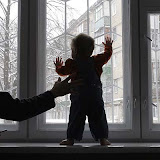Returning
from the Fukushima Exclusion Zone one day, I meet Hiroshi Watanabe outside the
train station. I watch with fascination as he straightens each bike in the bike
parking lot where he works. Wearing white gloves, he moves very precisely: he measures
a distance with his shoes, then grabs the next bike and stands it parallel with
the previous one, tall and evenly spaced.
The phrase ‘rearranging the deck
chairs on the Titanic’ keeps popping into my mind as I photograph Watanabe.
This isn’t really fair, I
admit, since Fukushima City is not about to sink. But why does the
municipality spend money on parallel parking of bikes while people remain in
crisis mode nearby and so many evacuees' needs go unmet?
The answer,
I think, is that the psychological effects of a disaster travel further and
less predictably than the physical ones. The residents of Fukushima—whether
directly affected by the earthquake or not—crave normalcy. They want
reassurance that Things Are As They Should Be. (See interesting commentary here). In the U.S., we would never
notice a chaotic bike rack, but in Japan, it’s just not right.
Watching Watanabe reminds me of a
woman I met in Ukraine whose job is gardener at the Chernobyl plant. She
maintains window boxes, planters and a big beautiful rose garden outside the
main building entrance. Seems crazy, I know. But after all, if you work there,
you want Chernobyl to look neat and attractive for visitors, don’t you?
Tomorrow: what is true?




